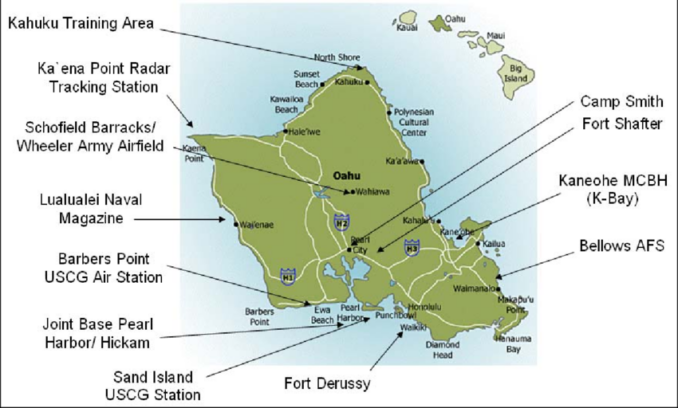U.S. military trains in Hawai’i to target China

Military installations on O’ahu, Hawai’i
Near the town of Wahiawā on the occupied Hawaiian island of O’ahu, the U.S. army is gearing up for war with China at the Lightning Academy, the 25th Infantry Division’s training camp near Schofield Barracks. Here, the Jungle Operations Training Course (JOTC) takes place over the span of a few weeks, where soldiers from all U.S. military branches as well as foreign military allies take part in special jungle warfare training.
At the top of the list for training are soldiers based in the United States Indo-Pacific Command region, an area claimed by the U.S. for military operations that makes up more than half of Earth’s surface and contains half the world’s population in 36 different countries.
Many U.S. soldiers are either already based in this command area or will be sent there upon completion of the JOTC. Soldiers that complete the JOTC usually take part in joint military exercises with foreign governments, including Thailand, Japan, Indonesia and especially the Philippines. These exercises, along with recent U.S. military base expansion into the Philippines, are part of a decisive shift of U.S. military focus towards Asia in recent years.
China the number one target
Over the last decade, with China playing a more prominent role in world politics and as an economic powerhouse surpassing the United States in many metrics, U.S. military attention has moved from the Middle East towards a more direct confrontation with China.
Jungle warfare training is conducted in occupied Hawai’i due to the lack of jungle environments on the U.S. mainland and its strategic positioning in the Pacific. Jungle training took place in Panama until 1999, when the Middle East became the primary theater of U.S. imperialist war and desert training was prioritized. But in 2013 the jungle training was reopened in Hawai’i, under the President Barack Obama administration’s “Pivot to Asia.”
U.S. military wreaks havoc in the Pacific
Although the war against China for which the U.S. ruling class is preparing hasn’t actually started, the presence of U.S. soldiers already takes its toll. While Hawai’i has faced resource shortages recently, including a lack of drinking water, Schofield Barracks maintains a population of about 15,000, which is a huge drain on the islands’ resources.
In addition, fuel stored near the U.S. bases has contaminated the aquifer supplying water both to the civilian population and to the troops and their families in base housing. (workers.org/2022/01/61110/)
There are decades of violent acts U.S. soldiers have perpetrated, such as murders and rapes, around military bases in Hawai’i, Japan, and the Philippines. But the violence isn’t limited to acts of violence by individual soldiers. U.S. joint military training is not only aimed at pressuring China, but also combatting revolutionary and progressive forces inside the countries that cooperate with the U.S.
Recently, ten members, including leading cadre of the Communist Party of the Philippines (CPP) were kidnapped, tortured, and killed. The Philippine government claimed they were killed in a “boating explosion,” but the truth is that these and the many others killed by the armed forces of the Philippines were victims of the U.S.-led counter insurgency efforts.
The same jungle warfare tactics, developed by the U.S. military and taught to Filipino soldiers to assist in war on People’s China, are also used to crush domestic revolutionary movements – as are the U.S. armed contra forces in Latin America and across the world. These tactics are used against the New People’s Army, which is currently waging an armed people’s war against the U.S.-backed regime of Ferdinand “Bongbong” Marcos Jr.
Anti-imperialism must be decolonial
The existence of this jungle warfare training camp in Hawai’i illustrates the need for a unwavering stance against imperialism, in opposing both the external U.S. military adventurism overseas, as well as the ongoing process of settler colonialism and genocide of Indigenous peoples within the occupied territories of the U.S. empire. A principled anti-imperialism must be consistent in both. Opposing U.S. wars overseas while denying Indigenous sovereignty over their land at home is not anti-imperialism, but reactionary isolationism.
Genuine anti-imperialism builds solidarity between the people in China, the Philippines, and Indigenous people in Hawai’i and the U.S. mainland, as well as the masses of non-native workers who foot the bill for the tremendously expensive Pentagon war machine.
A war with China would be catastrophic for workers and oppressed people around the globe. It would only benefit a small number of people who hide in the executive offices of weapons manufacturers and other U.S. corporations, getting rich with every bomb that drops.
One must notice the incredible hypocrisy of U.S. accusations of Chinese “military aggression” towards China’s own island of Taiwan – used as a justification for war – while the U.S. simultaneously occupies and imposes statehood on the islands of Hawai’i and uses them to train for that war.

